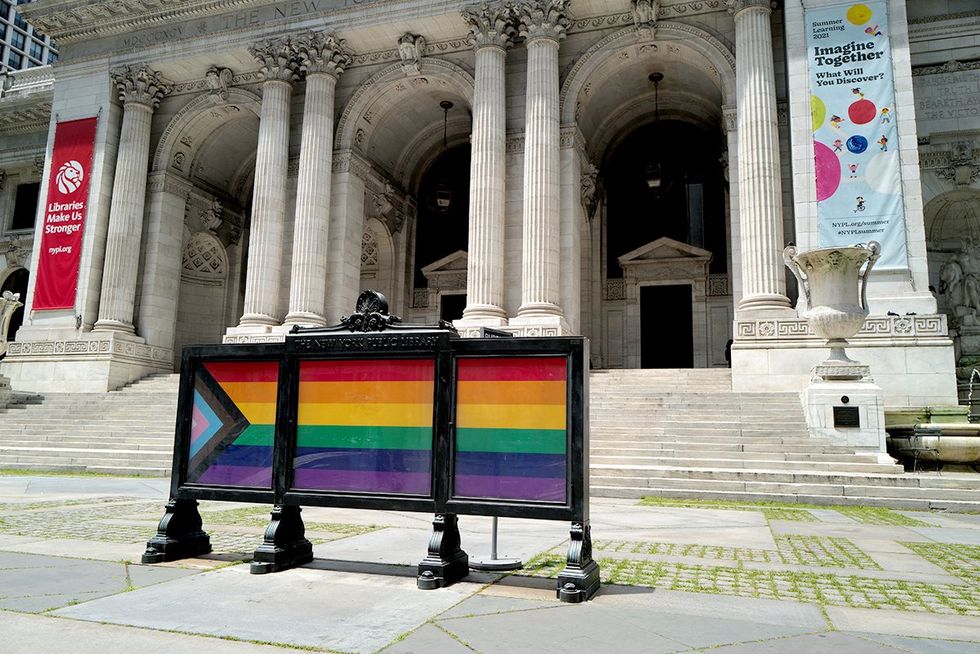During a recent panel discussion on book banning, the moderator asked me a question that stopped me in my tracks: “Was there a book you weren’t allowed to read or told you should not read, but you read it anyway, and it turned out to be important to you?”
For a moment, I was unsure of how to answer this question. Growing up in Idaho in the 1980s, there had never been a book I was told I could not read. In 2024, in the grand scheme of all the challenges we face as an LGBTQ+ community, maybe organized efforts to restrict access to books that tell our stories seem like a minor or lesser issue relative to being blocked from gender-affirming care, kept from sports teams, bullied in bathrooms or told we cannot enter bathrooms at all.
But while on that panel, facing the question of whether there was a book I was told I could not read at any point in my life, I realized that “no” was not a bad answer. It was a powerful one.
There were no conditions on who I could be as a reader. Growing up without those limits was so transformative that I became a librarian.
However, reading is more than just transformative for people who want to become librarians. It’s transformative for all of us. It’s time for community members to view attacks on books, libraries, and librarians through the same prism as those who oppose us. When people try to limit who we can be as readers, they’re really setting limits on who we can be as people.
When pressure groups attempt to ban more than 4,240 book titles—many of which are written by or about LGBTQ+ people—eliminating books is only part of the project. It’s to reject the people represented by those books and to limit the possibility, imagination, and normalization of who we can be, collectively, as a diverse society and individually, as members of a diverse society.

When book banners try to keep people from being seen or seeing others in books, they attempt to erase anyone different from a cultural story that increasingly embraces difference.
I’ve committed my life to libraries because I believe wholeheartedly in the power of books: to expand our imagination, drive our curiosity, teach us about our world, and help us all feel seen, especially in times and places where our realities do not match our highest aspirations for ourselves or the society we live in.
Growing up in Boise, Idaho, I didn’t see a lot of queer representation around me. The only lesbians I had ever heard of were the two women who ran the antiques store out on Overland Road. But I could find myself in the library and the magic of libraries. Libraries feel inclusive and personal while also feeling expansive and limitless. Librarians create that magic. They help every member of every community they serve feel welcome and valued within the walls of their libraries while building collections using professional best practices that meet the modern needs and sensibilities of readers from all walks of life.
In cities, counties, and states across the country, librarians are vitally protecting the freedom to read, and they do so under increasing challenge and stress. For National Librarian Day, I want us all to recognize these incredible library workers for who they are: valued members of our communities and active defenders of our democracy.
When we raise our voices to defend the freedom to read, we tell the world that we are committed to the freedom for all of us to exist, no matter who we are, where we come from, or what we know about ourselves.
There is no better way to celebrate our libraries and our futures than to honor the librarians who do the incredible work of including us in their communities and allowing our stories to take space on the shelves.
Watch an exclusive interview with Emily Drabinski and Advocate Channel's Aaron Deane
Emily Drabinski is the current president of the American Library Association and an associate professor at the Queens College Graduate School of Library and Information Studies.
Views expressed in The Advocate’s opinion articles are those of the writers and do not necessarily represent the views of The Advocate or our parent company, equalpride.















Charlie Kirk DID say stoning gay people was the 'perfect law' — and these other heinous quotes
These are some of his worst comments about LGBTQ+ people made by Charlie Kirk.